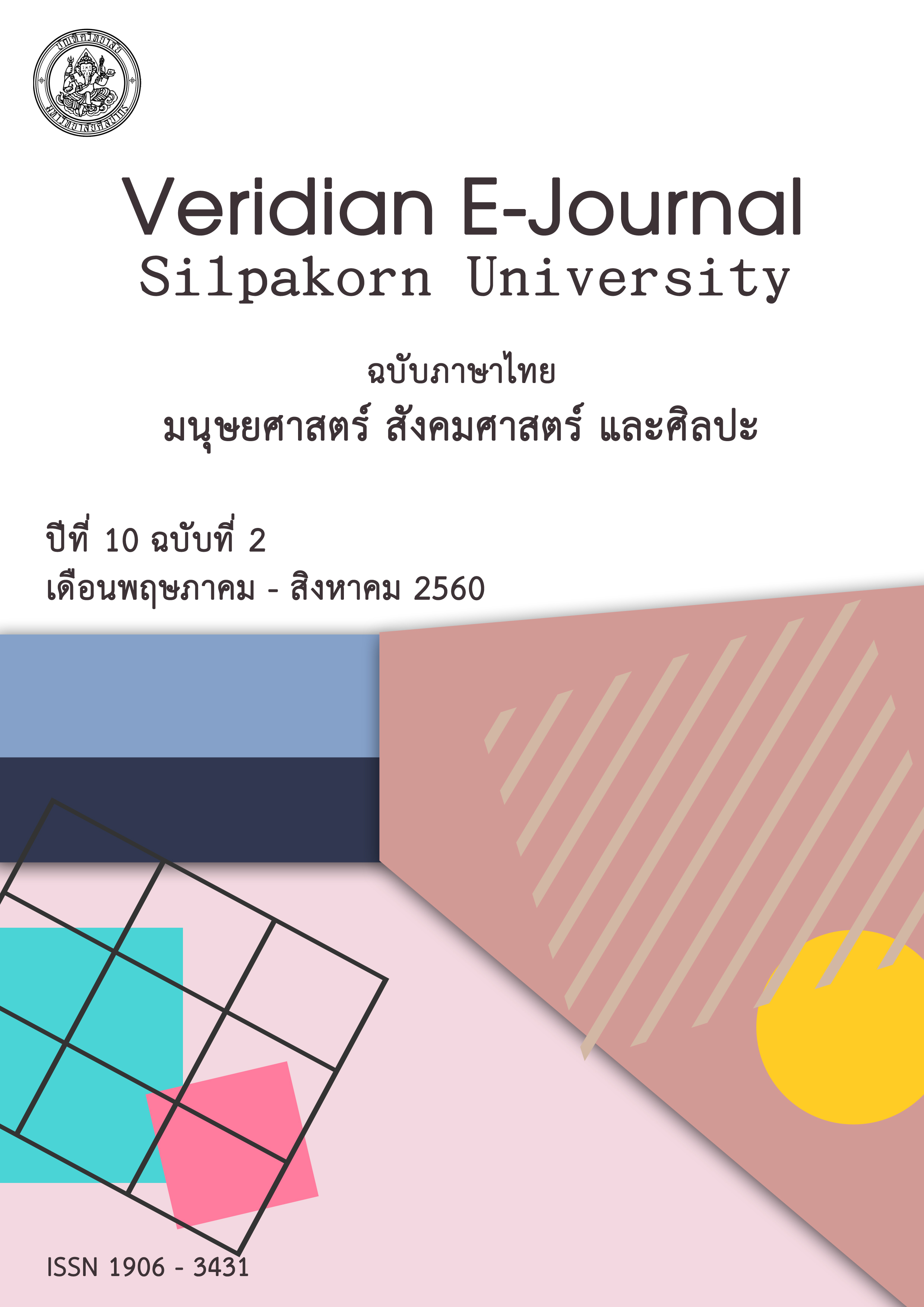การพัฒนาโมเดลสมการโครงสร้างปัจจัยบางประการที่ส่งผลต่อคุณลักษณะของบัณฑิตที่พึงประสงค์ ผลสำหรับกำหนดนโยบายด้านการประกันคุณภาพการศึกษาระดับหลักสูตรของคณะ
Main Article Content
Abstract
การพัฒนาโมเดลสมการโครงสร้างปัจจัยบางประการที่ส่งผลต่อคุณลักษณะของบัณฑิตที่พึงประสงค์ ผลสำหรับกำหนดนโยบายด้านการประกันคุณภาพการศึกษาระดับหลักสูตรของคณะ มีวัตถุประสงค์เพื่อศึกษาปัจจัยเชิงสาเหตุที่มีผลต่อคุณลักษณะของบัณฑิตที่พึงประสงค์ เพื่อตรวจสอบความสอดคล้องระหว่างโมเดลโครงสร้างองค์ประกอบคุณลักษณะของบัณฑิตที่พึงประสงค์กับข้อมูลเชิงประจักษ์ และเพื่อศึกษาข้อเสนอแนะเชิงนโยบายในการพัฒนาบัณฑิตที่พึงประสงค์ ใช้เทคนิคการวิจัยแบบผสมผสานระหว่างการวิจัยเชิงปริมาณ และการวิจัยเชิงคุณภาพ สำหรับประชากรที่ใช้ศึกษาในการวิจัยเชิงปริมาณได้แก่ อาจารย์ ผู้ทรงคุณวุฒิ และเจ้าหน้าที่ประจำคณะรัฐศาสตร์และนิติศาสตร์ มหาวิทยาลัยบูรพา และคณะวิทยาการจัดการ มหาวิทยาลัยศิลปากร จำนวน 140 คน โดยใช้การสุ่มแบบเจาะจง (Purposive Random Sampling) และกำหนดโควตา (Quota Random Sampling) เครื่องมือที่ใช้เป็นแบบสอบถาม สรุปข้อมูลด้วยสถิติเชิงพรรณนา และวิเคราะห์องค์ประกอบเชิงยืนยัน (Confirmatory Factor Analysis) สำหรับการวิจัยเชิงคุณภาพใช้วิธีการสัมภาษณ์เชิงลึก ผู้ให้ข้อมูลหลักจำนวน 20 คน ใช้แนวสัมภาษณ์เชิงลึกเป็นเครื่องมือ และการตรวจสอบข้อมูลเชิงคุณภาพแบบสามเส้า (Triangulation)
ผลการศึกษาปรากฏว่า ผลการศึกษาปัจจัยเชิงสาเหตุที่มีผลต่อคุณลักษณะของบัณฑิตที่พึงประสงค์นั้น พบว่า ในด้านการจัดการเรียนการสอน ให้เน้นองค์ประกอบด้านการบริหารหลักสูตร ในประเด็นควรให้ความสำคัญกับการปรับปรุงหลักสูตรให้ทันสมัยตามความก้าวหน้า โดยหลักคิดในการออกแบบหลักสูตรต้องมีความสอดคล้องกับวัตถุประสงค์ของหลักสูตรและการจัดรายวิชาต้องมีการจัดตามลำดับความยากง่ายหรือรายวิชาก่อน-หลังที่ควรจะเป็นให้สอดคล้องกันตามปรัชญาหลักสูตร สำหรับด้านการจัดสิ่งแวดล้อมทางการศึกษา ควรมีการอุปกรณ์อำนวยความสะดวกสำหรับการจัดการเรียนการสอนที่เหมาะสม, วัสดุอุปกรณ์ในการเรียนมีเพียงพอ และมีสภาพที่พร้อมใช้งานอยู่เสมอ และมีการจัดสภาพของห้องเรียนที่สอดคล้องกับบริบทของการเรียนทั้งในการเรียนภาคทฤษฎีและภาคปฏิบัติ ทั้งนี้ผลการศึกษาปัจจัยที่มีความสัมพันธ์ต่อคุณลักษณะของบัณฑิตที่พึงประสงค์พบว่าด้านการจัดการเรียนการสอนส่งผลทั้งทางตรงและทางอ้อมต่อผลผลิตบัณฑิตที่พึงประสงค์ และส่งผลทางตรงต่อการประกันคุณภาพการศึกษา อีกทั้งการประกันคุณภาพการศึกษายังส่งผลทางตรงต่อผลผลิตบัณฑิตที่พึงประสงค์ ดังจะเห็นได้ว่าการจัดการเรียนการสอนที่ดีนั้นจะส่งผลให้การประกันคุณภาพการศึกษาดีตามไปด้วย ซึ่งคือว่าการจัดการเรียนการสอนนั้นเป็นการจัดการคุณภาพการศึกษาด้านปัจจัยนำเข้า (Input) และสิ่งสำคัญทั้งสองปัจจัยล้วนเป็นปัจจัยสำคัญที่ทำให้ผลผลิตบัณฑิตที่พึงประสงค์นั้นมีประสิทธิภาพเพิ่มขึ้น ด้านการกำหนดนโยบายด้านการประกันคุณภาพการศึกษาระดับหลักสูตรของคณะ ที่นำไปสู่ความสำเร็จในด้านของการประกันคุณภาพการศึกษาระดับหลักสูตร สามารถสรุปเป็นข้อเสนอแนะในการพัฒนาบัณฑิตที่พึงประสงค์ โดยคณะควรจัดกิจกรรมส่งเสริมนอกชั้นเรียนให้นิสิตได้มีโอกาสพัฒนาทักษะการเรียนรู้ทั้ง 5 ด้าน ตามกรอบคุณวุฒิมาตรฐานแห่งชาติ ตลอดระยะเวลาที่ศึกษา โดยเฉพาะการเสริมทักษะการเรียนรู้ตลอดชีวิตบัณฑิตจะต้องมีคุณลักษณะเป็นบัณฑิตที่พึ่งประสงค์ของชุมชนและสังคม สามารถดำรงตนอยู่ในสังคมร่วมกับผู้อื่นได้อย่างมีความสุขและตรงตามความต้องการของผู้ใช้บัณฑิตบัณฑิตสามารถประยุกต์ใช้ความรู้เพื่อการดำรงชีวิตในสังคมได้อย่างมีความสุขทั้งทางร่างกายและ จิตใจ มีความสำนึกและความรับผิดชอบในฐานะพลเมืองและพลโลก เป็นบัณฑิตที่มีคุณภาพและมาตรฐาน
The Development of Structural Equation Model of Factors Influencing on Desirable Characteristics of Graduates for Establishing Policy on Quality Assurance of faculty’s Curriculum. The purpose is to study the causal factors affecting the desirable characteristics of graduates. To examine the consistency between the descriptive model, descriptive elements, desirable characteristics, and empirical data. And to study policy recommendations for the development of desirable graduates. This research was conducted by using mixed method research integrating quantitative research and qualitative research. Populations used in this research were 140 instructors, qualified persons, and staffs of Faculty of Political Science and Law of Burapha University and Faculty of management Science of Silpakorn University. They were obtained by using Purposive Random Sampling and Quota Random Sampling. Tool used in this research was questionnaire. Data were concluded by using descriptive statistics and Confirmatory Factor Analysis. For qualitative research, it was conducted by using in-depth interview with 20 key informants. Research tools were in-depth interview and Triangulation.
The results of the study on desirable characteristics of graduates showed that curriculum management factors should be focused for learning management by emphasizing on updating curriculum based on advancement. The main idea of curriculum design should be consistent with curriculum’s objectives and prioritization of courses must be based on difficulty or appropriateness to be consisted with the curriculum’s philosophy. For educational environment management, there should be some appropriate facilities for learning management with adequate quantity of instructional materials and devices in available condition as well as classroom management that was consistent with learning context of both theoretical learning and practical learning. The results of the study on factors influencing on the relationship with desirable characteristics of graduates showed that learning management factors gave both direct and indirect effects to production of desirable graduates as well as gave direct effect to quality assurance. Moreover, quality assurance also gave direct effect to production of desirable graduates. It could be seen that good learning management gave good effect to quality assurance that was considered that learning management was educational quality management on input. Importantly, both factors were also important factors enhancing efficiency of production of desirable graduates. For establishment of policy on quality assurance of faculty’s curriculum leading to success of quality assurance in curriculum level, it could be concluded as the suggestion for developing desirable graduates, whereas, the faculty should hold some out-of-class activities for providing some opportuniti4es to students to develop their 5 learning skills according to National Qualifications Framework during their learning period. Especially, students should be promoted on lifetime learning skill and they must have desirable characteristics of graduated of communities and society, i.e., be able to live with other people in the society happily and meet with demands of employers. To become quality and standard graduates, graduates must be able to apply their obtained knowledge for living in the society happily in both mental and physical dimensions with realization and responsibilities of Thai citizens and citizens of the world.
